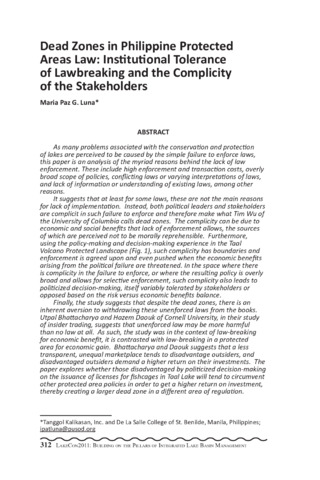Dead zones in Philippine protected areas law: Institutional tolerance of lawbreaking and the complicity of the stakeholders
- Global styles
- MLA
- Vancouver
- Elsevier - Harvard
- APA
- Help
Share
Abstract
As many problems associated with the conservation and protection of lakes are perceived to be caused by the simple failure to enforce laws, this paper is an analysis of the myriad reasons behind the lack of law enforcement. These include high enforcement and transaction costs, overly broad scope of policies, conflicting laws or varying interpretations of laws, and lack of information or understanding of existing laws, among other reasons.
It suggests that at least for some laws, these are not the main reasons for lack of implementation. Instead, both political leaders and stakeholders are complicit in such failure to enforce and therefore make what Tim Wu of the University of Columbia calls dead zones. The complicity can be due to economic and social benefits that lack of enforcement allows, the sources of which are perceived not to be morally reprehensible. Furthermore, using the policy-making and decision-making experience in the Taal Volcano Protected Landscape (Fig. 1), such complicity has boundaries and enforcement is agreed upon and even pushed when the economic benefits arising from the political failure are threatened. In the space where there is complicity in the failure to enforce, or where the resulting policy is overly broad and allows for selective enforcement, such complicity also leads to politicized decision-making, itself variably tolerated by stakeholders or opposed based on the risk versus economic benefits balance.
Finally, the study suggests that despite the dead zones, there is an inherent aversion to withdrawing these unenforced laws from the books. Utpal Bhattacharya and Hazem Daouk of Cornell University, in their study of insider trading, suggests that unenforced law may be more harmful than no law at all. As such, the study was in the context of law-breaking for economic benefit, it is contrasted with law-breaking in a protected area for economic gain. Bhattacharya and Daouk suggests that a less transparent, unequal marketplace tends to disadvantage outsiders, and disadvantaged outsiders demand a higher return on their investments. The paper explores whether those disadvantaged by politicized decision-making on the issuance of licenses for fishcages in Taal Lake will tend to circumvent other protected area policies in order to get a higher return on investment, thereby creating a larger dead zone in a different area of regulation.
Hence, the enforcement cost would be higher in terms of monitoring compliance with aquaculture regulations that are harder to monitor such as stocking density standards and feeding regulations.
Suggested Citation
Luna, M. P. G. (2013). Dead zones in Philippine protected areas law: Institutional tolerance of lawbreaking and the complicity of the stakeholders. In M. L. C. Aralar, A. S. Borja, A. L. Palma, M. M. Mendoza, P. C. Ocampo, E. V. Manalili, & L. C. Darvin (Eds.), LakeCon2011: Building on the pillars of Integrated Lake Basin Management (Second National Congress on Philippine Lakes) (pp. 312-313). Los Baños, Laguna, Philippines: PCAARRD-DOST.
Type
Conference paperISSN
1656-8099Series
Summary of Proceedings No. 1/2013;Koleksi
- LakeCon2011 [30]


